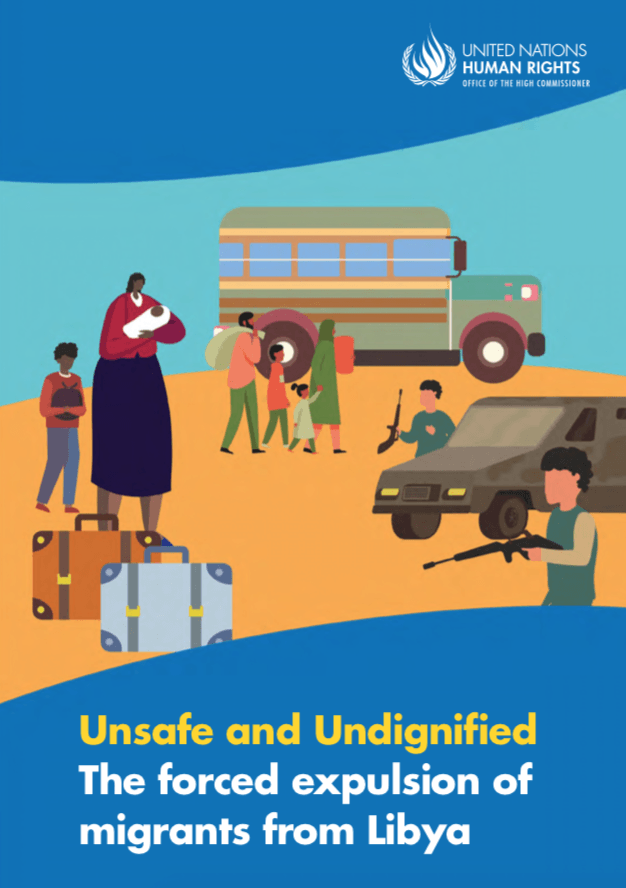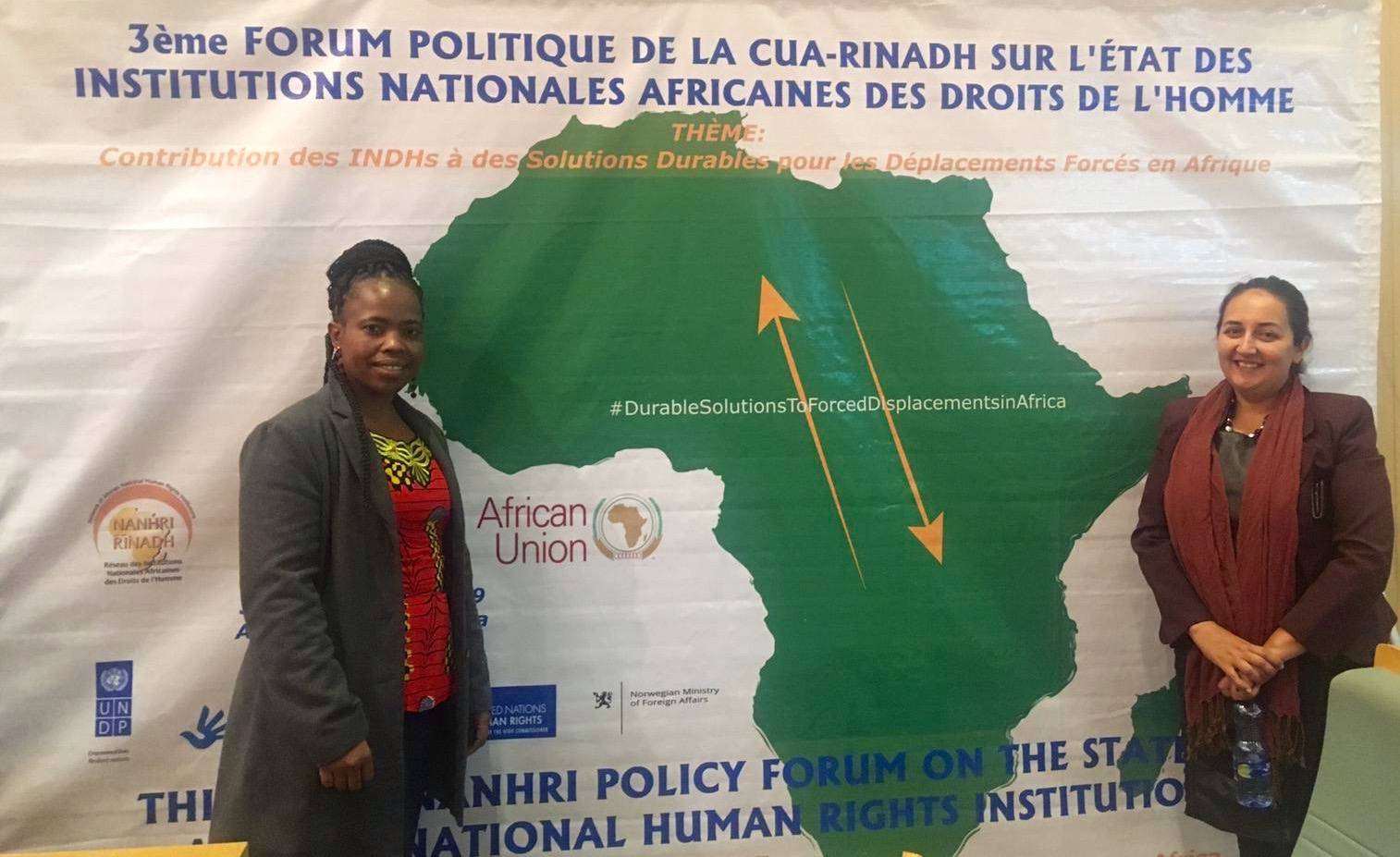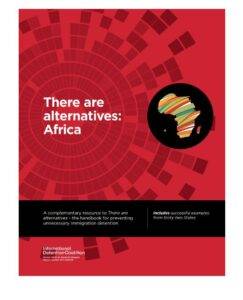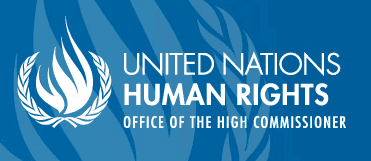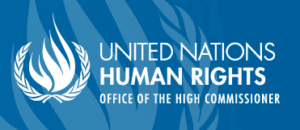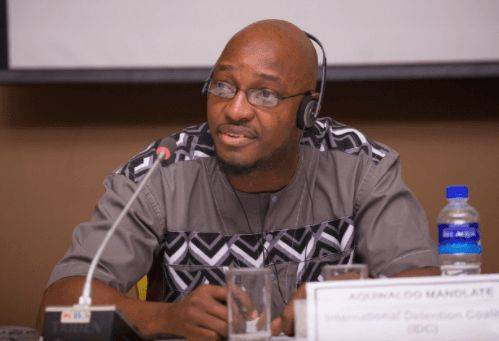OHCHR Report: Forced Expulsions from Libya
OHCHR just released a new and important report on 25 November: Unsafe and Undignified: The forced expulsion of migrants from Libya. According to OHCHR, the purpose of this report is to assess the key human rights challenges faced by migrants in the context of forced expulsions from Libya and to make concrete recommendations to States in the region, the international community, and other stakeholders for how to strengthen laws, policies and practices related to the protection of migrants in the context of forced return procedures in line with international human rights law and standards.

You can view the launch materials and web story here in English, French, and Arabic, as well as social media posts on Twitter, Instagram and Facebook in English, French, and Arabic.
Interview With Our New Africa Programme Officer
In September 2019, we welcomed Florence Situmbeko to the African team, she is based in Windhoek, Namibia. Florence, will bring her long experience as a frontline Social Worker for government, as well as anti-trafficking and project management expertise to support the IDC’s work. We asked her some questions:
The IDC has found that the most successful “alternatives to immigration detention” use individualised case management across all stages of the migration process, to ensure a coordinated approach to each case. Florence - what is your case management/social work experience and what do you see as the value of case work for individuals?
All social workers are trained to be case managers - whether you’re working with individuals, families or groups. My role as a social worker has typically involved listening to my client’s story - why they came to see me or why they were referred to me, following a case through from the beginning until the end. One recent case was a boy whose mother was a Namibian national living in Namibia his father was a citizen of another country. When the father passed away, the boy moved to Namibia to live with his mother. When the boy came to see me, we figured out together what their immediate needs and priorities were. From assessing if he needed a place to stay, something to eat, to see a doctor? We realised he only needed help with acquiring documents so he could reside regularly in Namibia with his mother. I accompanied him to the Ministry of Home Affairs, explained his case, and followed up with the case until he received the documents. I also made sure he was administered an interim receipt that would ensure he was immune to arrest or questioning by the police while his case was being resolved.
beginning until the end. One recent case was a boy whose mother was a Namibian national living in Namibia his father was a citizen of another country. When the father passed away, the boy moved to Namibia to live with his mother. When the boy came to see me, we figured out together what their immediate needs and priorities were. From assessing if he needed a place to stay, something to eat, to see a doctor? We realised he only needed help with acquiring documents so he could reside regularly in Namibia with his mother. I accompanied him to the Ministry of Home Affairs, explained his case, and followed up with the case until he received the documents. I also made sure he was administered an interim receipt that would ensure he was immune to arrest or questioning by the police while his case was being resolved.
Here, you can see that case management can range from more intensive for complex cases, and less-intensive such as administrative support for more self-sufficient migrants who already have their basic needs attended to, like the young boy.
We keep comprehensive, confidential case files on everyone who we assist. Protecting our client’s privacy is paramount, and this also links to our credibility as an Agency. We are able to discuss cases during our monthly reports in which we anonymise cases and share our challenges and shed light on systemic issues and recurring problematic or productive trends.
You mention systemic issues - as a case-worker, have you been involved in policy or advocacy work based on evidence gained through social work practice? In turn, how can evidence-based practice be used to create systemic change?
Yes, as a caseworker, it is worth being engaged with stakeholders who are drafting policies and maintaining good relationships with them - as, afterall, their work directly informs what happens on the ground. Social workers have a unique vantage point as they can feed information from the ground level upwards, illuminating gaps, what is working or what is not to better influence systemic change. If not, such policies are not based on context specific evidence, and we end up assuming.
Social workers have a unique vantage point as they can feed information from the ground level upwards
As a social worker with the Ministry of Gender, the Ministry of Health in Namibia, and then working with IOM, I provided input into legislations or policies. For example, with IOM, I gave inputs on what needs to be taken into consideration when dealing with victims of trafficking, including children, for the development of the Combating of Trafficking in Persons (TIP) Act, no. 1 of 2018 - to ensure the rights of people who might be more vulnerable than others. I was also part of a team that contributed towards the formulation of the Regulations on Human Trafficking and the National Action Plan on Gender Based Violence in Namibia.
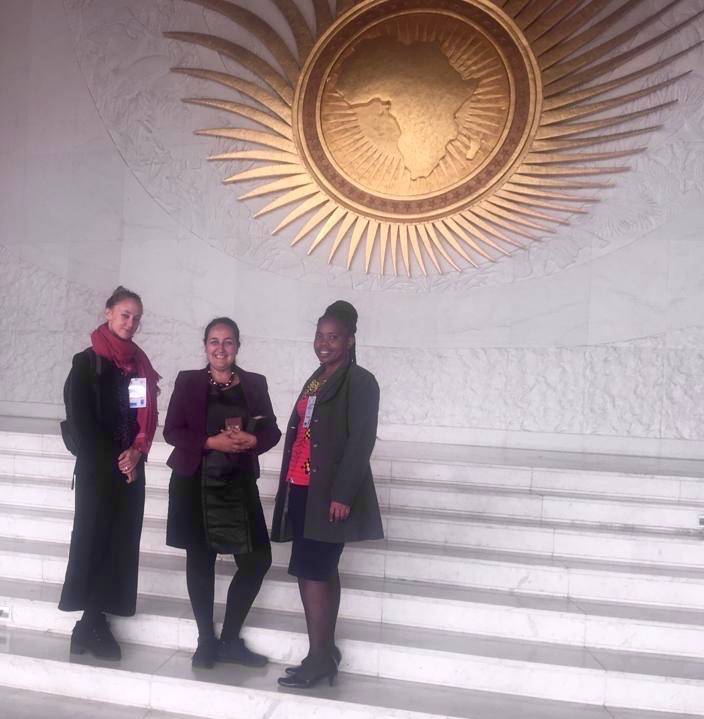
How have you worked with other stakeholders as a social worker to bring change and or support the people/”clients” you were working with?
Beyond the policy arena, we work with many other stakeholders to develop support systems for the people we work with. There is no way one institution can fully assist a person as the person has different needs. Therefore, networking is an important part of the social worker’s day to day tasks.
It is worth getting to know the services and organisations around you so you know exactly who to reach out to: “the Red Cross can help me with that”, “my contact at the Home Affairs head office will be able to help me with this”. As well as proving beneficial to the “client”, networking is also useful when it comes to advocating for specific policies/legislation.
Case conferencing is one useful way to maintain your networks and delegate responsibilities to different stakeholders. One case involved several young women who had been trafficked, and who wanted to return to their home country in Zambia. We called a meeting with a shelter manager, IOM, the police, Home Affairs, the social workers from the Ministry of Gender and Office of the Prosecutor General. Through individualised assessment of their cases, we assigned different responsibilities. We were also in contact with social workers in Zambia to ensure that it is safe for the girls to return back home and also ensured that their families were being prepared to receive them. The girls were reintegrated into their communities, after a number of counsellings sessions in order to minimise their vulnerability, for example, one family, based on what they requested received livestock, basic training on how to take care of the livestock and also basic training on financial management. Since the girls were minors arrangements were made for them to return back to school.
Thank you Florence, we are looking forward to working with you.
First MENA Regional Exchange on Alternatives
PRESS RELEASE
First MENA Regional Meeting of Peer Exchange and Learning Among States on Alternatives to Detention
Tunis 2-3 October 2019
Based on the Objective 13(h) of the Global Compact for Safe, Orderly and Regular Migration, the First MENA Regional Meeting of Peer Exchange and Learning among States on Alternatives to Detention especially for children and families was convened in Tunis on 2 and 3 October 2019. The meeting was co-organised and facilitated by the International Detention Coalition (IDC), the International Organisation for Migration (IOM) and UNICEF. Representatives of Ministries of Interior and Ministries of Social Affairs and their equivalents from Tunisia, Libya and Egypt participated in the meeting that resulted in fruitful discussions among the government counterparts, in the presence of representatives from the organisations that co-sponsored the meeting.
The meeting shed light on the growing momentum and latest developments of Alternatives to Detention in the MENA region, and discussed the relevance of the Global Compact on Migration with its focus on alternatives to detention, especially in its Objective 13, which clearly stipulates that the use of detention to be the last resort and to protect the rights and best interests of children.
The key findings of the research conducted by the IDC were presented to the participants, which confirms that alternatives can be applied in most cases, they are more affordable, more humane, highly effective and less costly.
The government representatives had the opportunity to present their national contexts of immigration detention and the existing alternatives that are being implemented in a roundtable discussion, followed by a presentation of the challenges facing each of their respective countries to advance and strengthen the implementation of alternatives for adults and to eventually phase out child immigration detention. The consensus among all the government representatives and the participants was that Alternatives to Detention exist in all countries in the MENA region, some codified in the national legislation, and some being implemented in practice.
During the final session of the meeting, the government representatives formulated an agreement of intent and initial steps to be pursued internally in their national contexts and at the regional level.
Draft Statement by Participants
- Migrants and refugees have human dignity and rights; they should be respected, and minimum standards of care provided in host countries.
- Migrants and refugees are not only vulnerable individuals but also contribute to the local economy and community life in the countries which host them.
- Alternatives to Immigration detention in the MENA region do exist, and good practices are found in every country in the region.
- There is a need to evaluate progress to date and improve data collection systems to build evidence which will facilitate improved migration policy.
- Cross border cooperation at the regional and global levels is necessary for effective responsibility sharing in migrant hosting practice. Locally developed responses should be expanded and promoted.
- The international community should support locally developed responses to migrant hosting.
- Where the legal framework allows, effective implementation should be prioritised. National laws could be updated in order to reflect and allow for the sustainability of successful local initiatives that are emerging in migrant and refugee hosting.
- Coordination between all stakeholders at the national level (governmental and non-governmental) is necessary for the development and implementation of Alternatives to Detention which contribute to the life of host communities.
- Early screening and referral can avoid unnecessary immigration detention and facilitate access to national systems.
- Migrants and refugees should be mainstreamed in the national systems in order to avoid creating costly parallel systems.
- Children should never be detained for reasons related to their migration status. Instead, meaningful alternative care systems should be developed.
Download a PDF of Press Release here.
For more information, please contact IDC's Africa & Middle East Regional Coordinator, Junita Calder: [email protected]
IDC Meets With Unaccompanied Children & Their Hosts in Egypt
During a visit to Cairo by the IDC MENA team in June 2019, we had the opportunity to interview two young people who arrived in Cairo without their family members. The meeting was facilitated by caseworkers who support those young people and also migrant parents who have taken these unaccompanied youth into their homes, as part of the Community Hosting Programme in Cairo run by St. Andrews Refugee Services (StARS).

At the present time, the programme includes 32 community hosts who are hosting a total of 53 Unaccompanied Children and Youth from 4 nationalities. Before hosting the Unaccompanied Children and Youth, the community hosts undergo a two-day training programme run by psychosocial workers which gives them some tools and insights into how best to host a child who is not part of their original family unit. So far, these trainings have been facilitated in four different languages native to the hosts and guests participating in the programme. The Community Hosts and Unaccompanied Children and Youth (UCY) who will be admitted into their households are matched based on their nationality, language, religion, and culture. According to the programme participants whom we met, this is a good way to ensure harmony in the household and decrease the risk of misunderstanding at home.
When asked about whether they felt like part of a family, one of the young girls recounted how prior to being admitted to the Community Hosting Programme she was having severe mental health issues, was left hopeless and seriously considered taking her own life. “I wanted to kill myself, I had no financial assistance and no one in this country to help me” she explained. However, now that she is being hosted by a family from her own country, she shared that she feels supported and protected by them. She added, “they [the StARS case workers] put me in touch with a host, and I entered a more stable life”
The Community Hosts shared a similar view to the youth, regarding their feeling like part of a family.
"There is no difference between her and my child … I see her as my own”, one of the hosts said.
Although the Community Hosts we interviewed seemed to be eager from the start to host unaccompanied children and raise them as their own, we are well aware that it is very challenging to find families who are willing to host for a multitude of reasons, some of which may be misconceptions. As such, we asked the hosts to explain how they would encourage others to extend the same hospitality as they did. One of the Ethiopian Community Hosts replied:
“According to our traditions, if you help a vulnerable man, you gain blessings from God and from society… As an Ethiopian, we have good culture to help a person, and with this training we are gaining more experience and understanding as to how to help a refugee.”
The young people being interviewed had a similarly positive opinion of the Community Hosting Programme. One of the girls explained that she feels safer now whenever she leaves the house in Cairo, because she knows she has a family waiting for her when she gets back. This reduces the risk of being apprehended and then lost in the detention system, with no one to follow up on her whereabouts. Another boy expressed the importance of treating the hosts as his own family and said that he usually communicates with them directly whenever he needs anything or when there is an issue at home to be resolved.
When asked about what they envisioned for their future, one of the young people said that he would like to launch and then be the director of a community-based organisation, in order to help other children and vulnerable adults. Another girl said:
“…My future is looking bright; I have good hopes. My caseworker is asking me what I need, what I want to do in the future. I am listened to."
The children collectively agreed that Community Hosting was far more desirable than a closed shelter where their needs are less likely to be met and their voices seldom heard. Also, the Community Hosts and the children all expressed the importance of having a caseworker following-up on their cases on a regular basis, which they said helps them resolve any issues and feel supported by the programme.
Regarding their protection concerns in the host country, one of the interviewees explained “We have no guarantees to live in this country. Without residence permit, you can be arrested and detained.” Another host added, “those without ID cards… they have serious problems to live normally and survive.” One of the hosts also expressed concern about female migrant domestic workers from his country, saying “Our girls are working as house maids in Egyptian households, and after a whole month of working, sometimes they are not paid. If they complain, the bosses call the police. There is no safety.”
Of course, Community Hosting is not the only solution for the many protection concerns that unaccompanied children, youth, vulnerable adults, and entire refugee and migrant populations face in countries in the MENA region. But at the IDC, we believe that it is the most desirable placement option for vulnerable migrants.
The expressions of goodwill by the hosts also demonstrate what is possible when all stakeholders work together to support displaced people. Such programmes do not solely rely on host governments and non-governmental organisations, but on the generosity of refugees and migrants themselves, who are more established than others in their communities, to help and support their own.
For more information about alternatives to detention and community hosting in the Middle East & North Africa, please contact IDC Africa & Middle East Regional Coordinator, Junita Calder: [email protected]
3 Key Trends in Africa & What They Mean For You
In early November 2019, the Network for African National Human Rights Institutions (NANHRI) will have their 12th Biennial conference on the theme: “The Global Compact on Migration (GCM): African NHRIs common vision, opportunities, and challenges in its implementation”.
The NHRIs will meet in Cairo (Egypt is the current Chair of the AU) to:
- Emphasize at the African level, the unique role of NHRIs in promoting a human rights‐based approach for the implementation of the GCM, as well as their role to contribute in the Follow‐up and Review of the GCM through the International Migration Review Forum to be held in 2020);
- Share and exchange best practices on human rights‐based migration governance among NHRIs and with CSOs.
- Sensitize African NHRIs on the African Union Migration Policy and Civil society organizations’ actions to defend migrants’ rights.
The IDC has been involved in the negotiation of the GCM at the global level. Immigration detention is a major focus. Objective 13 commits States to prioritising alternatives to detention and “working to end the practice of child detention”. The IDC has been invited to join the biennial conference and will be in attendance to offer technical support to the NHRIs participating.
THERE ARE ALTERNATIVES
Alternatives to detention provide a foundation for a solutions-based approach to immigration – with the aim of reducing, and ultimately ending the use of detention in migration governance, especially for children.
The International Detention Coalition (IDC) has identified 3 key trends across Africa that matter for migration governance.
- There are alternatives to immigration detention
- The political context is shifting towards their expansion
- There are increasing practical developments in their implementation
These trends have emerged from ongoing research that maps Alternatives to immigration detention across the Africa region. The most recent report, There Are Alternatives: Africa (TAA: Africa), was launched in Mauritania, alongside the African Commission for Human and Peoples’ Rights (ACHPR)’s 62nd Session, April, 2018.
Today, the trends continue to develop. This blog post will trace these trends, present updated examples, and explain what the trends mean for you – whether you’re affiliated with an NGO, an NHRI; or are a policy-maker or an international or regional diplomatic official.
Why We Wrote ‘TAA: Africa’
Since IDC became involved in Africa, from the time it was constituted in 2009, NGO members and policy makers requested descriptions of African alternatives to detention. They wanted to showcase their migration management efforts and use these examples to build an empirical evidence base to present to governments what is possible when creative approaches are applied to migration governance, rather than just defaulting to the use of detention.
IDC members gathered information about alternatives to immigration detention operating in their countries. The descriptions assembled in the report show that migration governance using alternatives, rather than detention, is clearly possible and works better both for the government and the individuals involved. Alternatives are more humane and more cost-effective.
Key Trend #1: There Are Alternatives
There is an existing array of policies or everyday practices used to support and manage people in the community at all stages of the migration procedure while their claims for status or protection are being processed.
In fact, the majority of countries do not normally detain non-citizens.
We found clear trends in the types of Alternatives available across Africa. Many countries have a strong presumption against detention in law (at least for some groups of migrants). This can be seen in Djibouti’s new Refugee Law that protects refugees from detention. There is a clear trend towards developing and rolling out standardised identification, screening and referral mechanisms, in recognition that migrants are a highly diverse population with different needs and motivations. This includes various National Referral Mechanisms being rolled out in many Southern African countries and the “screening out” of migrants from detention in Tunisia and Libya by NGOs.
There is a movement toward use of case management systems.
Although some are limited, many are going beyond the legal aspect of the case and becoming more holistic. IDC members who engage in case management recognise that some individuals are in need of a high level of support whereas others require barely any support. Not only in each individual country, but there are an increasing number of cross border collaborations between governments in attempts to harmonise case management systems. One example of this is the West African Network – a case management system for migrant children and youth across 16 ECOWAS states, based on harmonised standards.
Placement options are already available in host communities.
Shelter models are especially common – particularly for vulnerable migrants, such as safe houses for people who have been trafficked. There is also a trend towards complete deinstitutionalisation of children into foster care and host family models. A recent example of this is a South African court ruling in 2018 expanding the application of adoption legislation to all children within South Africa’s borders. In Libya, Community Hosting care arrangement pilots are being run as pilot programmes by civil society groups, on behalf of UNHCR and by the IOM, with the knowledge of the government.
Key Trend #2: The Political Context is Shifting
There are increasing state commitments in national, regional, international laws and regulations to develop and implement Alternatives.
It is clear, there is growing momentum around using Alternatives as a strategy for reducing immigration detention.
On a national level, we have seen states move forward to develop and implement Alternatives. This is manifest in the creation of Working Groups specifically on this issue, for example, in Libya, or in the form of government and civil society Roundtables, for example, in Malawi. Some technical working groups (TWG) and the Alternatives they have been able to establish have been visited by delegations from neighbouring countries. Most notably we are seeing this happen in Zambia where a sharing of good practice on Alternatives is evident through study visits across borders.
On a regional level, there are regional processes working towards Alternatives both directly and indirectly. Through the Migration Dialogue for Southern Africa (MIDSA) dialogue, Southern African Development Community (SADC) member states are directly pursuing Alternatives by committing to “develop and implement Alternatives”. They are required to implement Regional and National Action Plans and report back on progress annually as they expand alternatives to detention.
The trend towards Alternatives is reflected in working towards a stronger presumption of liberty by facilitating lawful migration within regional blocks.
These include the Southern African Development Community (SADC); Economic Community of West African States (ECOWAS); and the Common Market for Eastern and Southern Africa (COMESA), to name a few.
On an international level, the benefits of alternatives to detention, as opposed to the human and financial costs of detention, are well documented. Hence, they are emphasised in the two draft Global Compacts (the one on Refugees; and one on Safe and Orderly Migration) and in UNCHR’s Beyond Detention strategy – which has expanded its focus countries in this region to include: Zambia, Botswana, Zimbabwe and South Africa.
Key Trend #3: Practical Developments
Alternatives are being piloted and the results are good for both migrants and host communities through migrant’s economic and cultural contributions.
More and more, we are seeing that States are recognising the benefits of regularising non-nationals within their territories, thus reducing the population of people at risk of detention, by pursuing Alternatives.
There is a wealth of evidence that promoting refugees and migrant’s ability to reside safely in a country on a temporary basis and providing them with the right to work firstly, reduces refugee and migrant reliance on state or charitable resources – as migrants can earn money to provide for their own basic needs. And secondly, giving migrants the right to work in a host country boosts the local economy by providing customers to local businesses and even, sometimes, an increase in jobs for locals.
We are seeing this recognition manifest in various ways. Firstly, through the aforementioned expansion of regular migration pathways within sub-regions. There is a pilot currently underway on the Zimbabwe Zambia border on labour rights under the COMESA. Secondly, through the removal of reservations to International Human Rights Instruments. Zambia is removing reservations to the Refugee Convention to permit the rights to work and freedom of movement, therefore allowing access to employment. Finally, States have administered blanket “amnesties” for undocumented workers. For example, plans were announced in Algeria in 2017 and 18,000 one-year residency permits were granted to irregular migrants in Morocco in 2013.
In addition, there is a trend to use migration funding to further advance host community infrastructure and systems, rather than developing wasteful parallel systems for migrants which also create isolation and xenophobia.
We have seen this mainly in health and education systems. For example, in 2019, the government of Uganda unveiled a five year health sector response plan for refugees and host communities, targeting at least eight million people in refugee hosting districts. Also, see our example of the health clinic at the Action Africa Help Zambia Transit centre in Lusaka in the report (p.13).
This point also highlights the trend in migration governance to recognise this need for social cohesion and provide for the additional strain on host communities. In new settlements in Uganda, about 30% of the resources of humanitarian response will go towards improving local infrastructure.
What These Trends Mean For You?
In light of the three trends from that emerged from research for the report, there are a number of key takeaways for stakeholders’ keen to build systems that do not use immigration detention.
If you are a policy maker, this means that there are a range of case studies to use to inspire implementation of Alternatives in your national context with shared benefits for migrants and citizens. Of course, there is no model or one size fits all Alternative, but you can take any elements that might work if adapted in your national context.
If you are an NHRI or an NGO, you can get alongside policy makers who might like to explore Alternatives to respect human rights, reduce cost and increase effectiveness of migration governance in your country, and maybe even support them to run a pilot. Or, you could lead the way by establishing a pilot for vulnerable refugees and migrants in your own communities. The things you learn by doing so would also contribute examples of good practice for future policy.
If you are an international or regional diplomatic official, we hope that you can use the case studies to break policy deadlocks. In bilateral meetings, you can identify avenues to protect your own citizens from immigration detention in other states; in multilateral meetings, you can identify or expand opportunities for shared regional approaches; in international meetings, you can use examples of Alternatives to support arguments for particular commitments in inter-governmental agreements (such as the Global Compacts) as well as showcase good practice in your domestic and regional laws, policies and practices.
You may also have many case studies of these kinds of systems that avoid use of detention that are not in the report – if so, please be in contact with Tiffany Shakespeare ([email protected]) so we can include your great practice in the next round of research.
In sum, the research for the report has demonstrated the widespread use of Alternatives in the Africa region, the growing momentum around the development of Alternatives globally, and the increasing practical developments taking place that yield benefits for governments, migrants, and host communities. There are organisations such as ours, the International Detention Coalition (IDC), who can provide technical expertise in the development and/or expansion of Alternatives and advise on how to use alternatives to immigration detention as a strategy for reducing unnecessary, inhumane and costly immigration detention.
For more information, read the report which is available to download: There Are Alternatives: Africa
Please also read and download the Guide for Policy Makers, available in English and French.
Finding Solutions Together in Africa
IDC at the NANHRI & AU Policy Forum
As a result of the IDC’s collaboration with the Network of African National Human Rights Institutions (NANHRI) over the past few years, we were invited to speak at the NANHRI and the African Union Commission Department of Political Affairs (AUC-DPA) Policy Forum in Addis-Ababa, Ethiopia in September 2019. This years theme was: “National Human Rights Institutions’ (NHRI’s) contribution to Durable Solutions on Forced Displacements in Africa.”
Junita Calder, IDC’s Regional Coordinator for Africa and the Middle East, gave a presentation on the role that alternatives to traditional, broken migration systems can play in enabling migrants to contribute to economic development across the continent.
This links to IDC’s broader vision: a world without unnecessary immigration detention; and with Rights & Dignity for all who migrate. We are interested in “real world fixes” that acknowledge legitimate government aims and work to achieve these through a problem solving approach. Calder highlighted that:
Alternatives require that migrants’ basic needs be met, within host communities. Therefore, if migrants can contribute economically while in the country, it creates a win-win situation, ensuring their rights, as well as continued benefits to host communities, during – and after – their stays.

The Possibilities of Creative Approaches to Migration Governance
Calder shared examples of “Alternatives to immigration detention”, which can be found in “There Are Alternatives: Africa.” These examples have been collected by the IDC over the past 10 years from NGO members, with the aim to showcase their migration management efforts and use these examples to build an empirical evidence base to present to governments (in national, regional and international policy spheres) what's possible when creative approaches are applied to migration governance, rather than defaulting to the use of harmful, costly and inefficient detention.
Importantly though, solutions must be tailored to the particular national circumstances. The IDC promotes a pilot approach – supporting the implementation of alternative migration management that is adapted to the context, and subject to constant review and adjustment.
International, Regional & National Frameworks to Promote Alternatives
Calder also signposted a range of international, regional and national legal and policy frameworks that promote rights-respecting migration management. Readers, as well as those who were present at the Policy Forum, might find these a useful resource:
INTERNATIONAL FRAMEWORK
- MDGs: Millennium Development Goals & SDGs: Sustainable Development Goals.
- GCM (Migrant Workers at their families Convention, et al. and ongoing guidance by relevant bodies).
- GCR (Refugee Convention and ongoing guidance by relevant bodies).
- UDHR and Human Rights Framework more broadly.
REGIONAL AFRICAN FRAMEWORK
- Africa’s approach to Alternatives – and therefore the potential for migrants’ economic contributions – is unique and world leading. The African Common Position when negotiating the GCM was strong. Removing the criminal nature of sanctions; ending child detention.
- The Policy framework exists; and is good: OAU Convention on Refugees and the Kampala Convention.
- One practical example, economically motivated but rights-respecting is: Agenda 2063; and the practical steps towards it so far:
- AU Migration policy framework (2018-30)
- Role of the RECs in increasing legitimate pathways
NATIONAL FRAMEWORK
- National Constitutions
- Other Human Rights Frameworks
- Refugee and Anti-Trafficking Acts
- Migration Policies
- Labour Rights Protection Legislation
- NHRIs roles
- Monitoring all Alternatives and access to decent work
- Monitoring places of detention NPMs and other monitoring guides/frameworks
Moving Forward: What Now?
The IDC is looking forward to working with NANHRI, specifically, to help with the implementation of their Plan of Action that outlines ways in which NHRIs may contribute to finding durable solutions to forced displacement.
Here are the ways the IDC suggested African NHRIs and the AU governments present can now be active:
What can African Human Rights Institutions do to ensure dignity for all who migrate?
- When undertaking investigations and submitting reports, HRIs can include solutions-focussed recommendations about regular pathways, right and access to decent work for migrants and refugees
- HRIs can point to initiatives, especially African examples that already exist; which may have solved the situation that the HRI had been asked to investigate or comment on, if implemented properly in the national context(s)!
What can the AU governments do to ensure dignity for all who migrate?
- Be confident that there is a large body of evidence out there about alternative migration governance which harnesses the economic contributions of migrants so that being a host is not only burdensome.
- When representing their nations, they can feel a productive part of the African approach to the migration-development nexus which promotes more productive migration and migrant human rights compliance; not just unnecessary securitisation.
- African countries can carry out policy audits or Legal Environment Surveys (LEAs) that point to the rights for migrants.
If you, as a civil society organisation, have ideas of how NANHRI or African HRIs can work with you, please be in touch.
- [email protected] - Junita Calder, Africa & Middle East Regional Coordinator
- [email protected] - Florence Situmbeko, Africa Programme Officer
- [email protected] - Tiffany Shakespeare, Africa & Middle East Network Coordination Programme Officer

Africa is Leading the Way
Significant Changes in Refugee Policies Regarding Integration and Enjoyment of Rights
The government of Ethiopia changed its refugee laws, granting refugees access to work, banking and financing services. According to the All Africa news website “Even with its economic struggles, Ethiopia has recognised the positive impact that refugee integration could have on its communities and local economies.”
In January, the government of Uganda has unveiled a five year health sector response plan for refugees in the country, together with host communities, targeting at least eight millions people.
Updates From IDC Africa Members

- Refugee Law Project (RLP) Uganda is celebrating their 20 year anniversary this year (#RLP@20). This month they launched their new “Training Manual” and “User Guide” on “Refugee Rights and Protection” which are available to download here. Launched after months of research and consultation, the guides can be used to facilitate quality capacity building programmes that improve refugee-and-host community relations, through enhanced protection, in Uganda and elsewhere.
- Lawyers for Human Rights South Africa (LHR) staff member, Faith Munyati was a panelist at the event: “Does South Africa welcome African refugees?” held on 19 February to discuss the challenges and possible solutions to the ailments affecting the refugee and asylum regime in South Africa. More information here.
- CoRMSA South Africa, in collaboration with Johannesburg Child Welfare, hosted a workshop on refugee, migrant and asylum seeker rights, providing children with an opportunity to have their voice heard in advocacy work.
- Refugee Consortium Kenya (RCK) held a community dialogue forum with Kenyans and refugees in Kitengela to discuss elimination of violence against women and girls.
IMPORTANT: Call for Inputs on Immigration Detention
WHAT: The Committee on the Protection of the Rights of All Migrant Workers and Members of Their Families has decided to elaborate General Comment No. 5 on Migrants’ Rights to Liberty and Freedom from Arbitrary Detention. This is a critical opportunity to provide input and feedback on fundamental human rights issues. The Committee invites all stakeholders to provide inputs to this initiative through a questionnaire by 1 April 2019. The concept note and questionnaire are available in English and Spanish HERE.
HOW: Please send responses electronically in Word format to [email protected] with subject line “Submission for General Comment on Migrants’ Right to Liberty.” Submissions should not exceed 10 pages. Written submissions will not be translated and should preferably be submitted in English, however submissions in French and Spanish will also be accepted. All submissions will be posted on the webpage of the Committee unless explicitly indicated to the contrary.
Any questions should be addressed to the Secretary of the Committee, Mr. Luc Mubiala, at [email protected].
If you would like to inquire about being connected to other organisations in your region also working on responses, please contact the following IDC regional offices:
Americas [email protected]
Europe [email protected]
Africa [email protected]
Middle East & North Africa [email protected]
Asia Pacific [email protected]
Adopting Alternatives: An Opportunity for Africa
A key forum in Africa highlights a significant opportunity in Africa.
The IDC, invited by the Africa Commission for Human and Peoples Rights (ACHPR) Committee for the Prevention of Torture in Africa (CPTA) and the Special Rapporteur on Refugees, Asylum Seekers, Internally Displaced Persons and Migrants, joined a panel discussion on the Situation of Migrants at Risk of Torture and other Ill-treatment in Africa: Alternative Approaches during the 63rd Ordinary Session of the African Commission.
"State representatives and the Commission members expressed a real interest in solutions..." Dr. Mandlate at ACHPR 63
Dr. Aquinaldo Mandlate from IDC member organisation Southern African Litigation Centre (SALC) represented the IDC. He spoke alongside Commissioner Hatem Essaiem (Chairperson of the CPTA); Commissioner Maya Sahli-Fadel (Special Rapporteur); Judge Malick Sow (Member of CPTA); and Mr Mamina Jallow (Member of the Gambian Returnees from Backway Association).
The Panel drew attention to the situation of migrants in Africa. Judge Sow, Commissioners Essaiem and Sahli-Fadel highlighted the risk of torture and other ill-treatment of migrants during their journeys, especially in detention; also pointing out the duties of States to prevent such abuse under the Guidelines and Measures for the Prohibition and Prevention of Torture, Cruel, Inhuman or Degrading Treatment or Punishment in Africa (the Robben Island Guidelines). Mr Jallow then humanised the discussions by poignantly sharing his own experience of abuse, extortion and ill treatment while travelling from The Gambia across Mali, Mauritania, Burkina Faso, Niger and Libya, in the hope of reaching Europe.
Dr. Mandlate outlined solutions to the problem. He presented “Alternatives to detention” as a strategy that Governments, along with civil society, can pursue in order to implement more humane, effective and affordable migration management systems.
He described some examples of alternatives currently in operation across the African region. Others can be explored in the IDC’s “There are Alternatives: Africa” report, launched earlier this year.
IDC member Aquinaldo Mandlate speaking on the Panel. Photo Acknowledgement, ACHPR.
Questions and comments were raised by representatives from the Arab Republic of Egypt; the National Preventive Mechanism (NPM) of the Islamic Republic of Mauritania; the National Human Rights Commission of the Republic of Rwanda; Prisoners Rehabilitation and Welfare Action (PRAWA); Advoc Aid Sierra Leone; Equality Now – Solidarity for African Women’s Rights (SOAWR) Coalition; and la ligue marocaine pour les droits de l’homme. The discussions touched on three pressing issues that African governments should address in order to increase the safety of migrants and ensure Alternatives:
- The lack of both socio-economic opportunities in their countries and legitimate migration pathways which is pushing people to embark on dangerous journeys
- The military crises and conflicts fueling insecurity and forcing people to flee
- Corruption among relevant authorities that leads to abuse and extortion of migrants
Commissioner Essaiem closed the panel by urging states to use Alternatives as a solution.
Dr. Mandlate noted: “State representatives and the Commission members expressed a real interest in solutions which will prevent torture of African migrants in the future. This proves there is much space for engaging stakeholders in the development and implementation of effective Alternatives to immigration detention in Africa.”
The IDC looks forward to finding ways to support African states in their implementation.
For further information please see the ACHPR press release on the same matter or contact the IDC Africa Regional Coordinator, Junita Calder via email: [email protected]
Our Work in MENA: A Year in Review
North African alternatives to detention collected in new report: “There Are Alternatives: Africa”
There Are Alternatives: Africa describes examples of “alternatives” in operation across North Africa and was launched alongside the African Commission on Human and People’s Rights (ACHPR) 62nd Session in Mauritania. The IDC ran a side event on alternatives to detention identified across the African continent that are more humane, less expensive and more efficient at achieving case resolution.
Commissioner Maya Sahli-Fadel, Special Rapporteur on Refugees, Asylum Seekers, Migrants, IDPs, and Stateless Persons, was one of three speakers on the Panel discussion who highlighted the importance of identifying opportunities for shared regional approaches that assist in reducing the need for unnecessary immigration detention. Read her guide for policy makers, an introduction piece for handbook. The French translation is available, here.
See the Launch Agenda here and more information about the launch here.
The research for the report has highlighted three key themes. Firstly, there is widespread use of Alternatives in the MENA region, the IDC looks forward to publishing further findings on this as a result of our current research project (see more about ongoing field visits below). Secondly, there is growing momentum around the development of Alternatives globally. Thirdly, there are increasing practical developments in the implementation of Alternatives that yield benefits for governments, migrants, and host communities. For example, registration and provision of work permits to migrants who find themselves in an irregular situation in Morocco and Algeria.
African Commission on Human and Peoples’ Rights (ACHPR) 62nd Session, Mauritania
Junita Calder, IDC's Africa Regional Coordinator was invited by Honourable Commissioner and Special Rapporteur on the Rights of Asylum Seekers, Refugees, Migrants, Stateless Persons and IDPs Maya Sahli-Fadel to talk on the Panel “Understanding and Management of Mixed Migration in North and Sub-Saharan Africa” during the ACHPR Ordinary Session.
Meeting with Mauritanian NGO members
While in Nouakchott, IDC Middle East and Africa team met Mauritanian NGO members and partners to discuss how the IDC might be able to support them through combined advocacy and explored areas for future collaboration. We were particularly impressed by the women’s vocational training centre we visited which makes freedom of movement a reality, by supporting women from west African countries to access non-exploitative employment and support their children; eventually allowing them the economic freedom to return home, if they wish to or to begin the process of integration.
Middle East and North Africa Research Visits
The IDC is hoping to capture some of the learning about how Middle East and North Africa (MENA) governments have managed to host large numbers of refugees and migrants since the onset of the Syrian conflict, without resorting to the widespread use of immigration detention.
The IDC undertook study visits to Egypt and Lebanon in August and September. The visits aimed to document how alternatives to detention, especially case management systems, have been explored, developed and implemented en mass.
Case management, as we understand it, goes beyond following up on an individual’s migration status determination process. It is instead, a comprehensive and systematic service delivery approach designed to ensure support for and a coordinated approach to, the health and well being of people with complex needs and abilities.
The IDC MENA team explored what is working, what fits the local context, what doesn’t and why? The research is ongoing so if you have suggestions of alternatives that we should profile please get in touch: [email protected]
Next Gen Index scorecard launch in Lebanon
IDC, the Global Campaign to End Child Immigration Detention together with Insan Association launched the Lebanese “Next Gen Index” in Beirut, 4th September 2018.
The Next Gen Index is an important advocacy tool that ranks States on their progress in ending child immigration detention, and Lebanon came second last, behind the USA, with 18 points. The launch event created space for a conversation about child immigration detention, using the standard scoring framework to reflect honestly on the situation in Lebanon. Read more about the launch here and download the Lebanon report here.
Next Gen Index Israel
The Israel Scorecard Committee, comprised primarily of IDC member Hotline for Refugees and Migrants, completed the Next Gen Index for Israel. Their country report is available to download here.
Ongoing engagement in Libya: Increased capacity to offer Alternatives to Detention
Since 2015, IDC have been engaging and working with IOM and the Danish Refugee Council programmes in Libya. Working alongside these organisations, IDC has been running capacity building workshops for and providing technical advice to a range of Libyan NGO and Government staff, as well as embassy representatives based there. The workshops, training and research have inspired the design of local alternative to detention programming options. IOM Libya has since increased staff to capacity to exclusively support alternatives to detention in Libya and IDC will continue supporting the development and piloting of host family and shelter alternative models.
UNHCR Global Detention Strategy
IDC attended a Global UNHCR Global Detention Strategy (GDS) internal meeting in April 2018 and met with both the Detention focal points from UNHCR Iraq and UNHCR Israel to hear insights into alternatives to detention in their national contexts. IDC MENA was then able to introduce UNHCR Iraq to the IDC Asia Pacific team and IDC Director when attending the UNHCR's Roundtable on Reception and Care Arrangements for Asylum-Seeking Children in Bangkok, Thailand 10-11 October 2018.
Engagement with MENA members and partners:
The IDC has engaged with around 200 MENA members and partners, with whom the IDC has shared their advocacy tools, including: IDC Online Training Toolkit; The Roadmap for States to Develop Alternatives to Detention; The Roadmap for States to End the Immigration Detention of Children; The Alternatives to Detention Database; The Global Campaign to End Immigration Detention of Children’s the Next Gen Index resources such as the Key Global Trends Report and the Global Launch Webinar. Around 10 new MENA members have joined the IDC in 2018, most of whom are from Lebanon, Mauritania, and Egypt. In addition, the IDC was able to connect organisations working on similar issues, both regionally and nationally.
